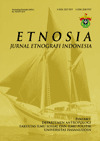Abstract
The article aims to explain Butonese women work ethics focusing on three factors, namely the development of work ethics, the aspects, and the challenges in developing their businesses. The research is a qualitative research with case study. The study is conducted in four villages in Luhu Hoamual District and West Seram District in Maluku Province, including Temi, Tapinalo, Mangge-mangge, and Eli. The informants were the Butonese women whose professions are traders. The methods used in this research are observation, interview and library research. The data analysis was done through reduction, presentation and concluding processes. This study found that the work ethic of Butonese women is not due to a religious calling as Weber said, but as a rational choice following Coleman ideas of surviving from the nature challenges, business opportunities, and family’s economic condition. In this process, two professions with different orientations were born. The pajibujibu sell their agricultural and plantation products from the west coast of Seram in Ambon city, meanwhile, the papalele sell fishery products on the west coast of Seram and the Hitu peninsula. If papalele is easy to get access to capital for business development, pajibujibu finds challenges to get it. Therefore, pajibujibu finds difficult to develop the business in compared to papalele. Nevertheless, both play important roles as actors in the economy of coastal communities.References
Abdullah, T. (1986). Agama, Etos Kerja dan Perkembangan Ekonomi. LP3ES.
Anoraga, P. (2001). Psikologi Kerja, Edisi baru: Jakarta. Rineka Cipta.
Bolu, W. M. E. V. (2019). BAWINE: KARYA TARI YANG TERINSPIRASI PADA CITRA PEREMPUAN BUTON. JOGED: Jurnal Seni Tari, 13(2), 142–157.
Butar, C. B. (2020). Statistik Daerah Provinsi Maluku. BPS Provinsi Maluku.
Hamid, A. R. (2011). Orang Buton: Suku Bangsa Bahari Indonesia. Ombak.
Hamid, A. R. (2016). Binongko people’s life in Coral Island. Wacana, 17(1), 19–37. https://doi.org/10.17510/wacana.v17i1.451
Hamid, A. R. (2015). Membaca (Kembali) Identitas Binongko: Perspektif Sejarah. International Conference on Language, Culture and Society (ICLCS), 37–45.
Kasman Renyaan. (2016). Budaya Maritim Migran Buton di Pantai Barat Seram 1942-2002. Universitas Negeri Makassar.
Lawang, R. M. Z. (2005). Kapital sosial dalam perspektif sosiologik: Suatu pengantar. Fakultas Ilmu Sosial dan Ilmu Politik, Universitas Indonesia (FISIP UI) Press.
Masdupi, E., Rasyid, R., & Rahmiati, R. (2019). Pengelolaan Keuangan dan Akses Permodalan Sebagai Solusi Dalam Pengembangan Usaha Kecil Sulaman di Nagari Panampuang Kabupaten Agam Sumatera Barat. Jurnal Penerapan IPTEKS, 1(2), 50–57.
Naping, H. N. (2013). Modal Sosial Sebagai Strategi Pengentasan Kemiskinan Secara Mandiri Pada Desa Nelayan di Sulawesi Selatan dan Sulawesi Barat. SOCIUS: Jurnal Sosiologi, 1–14.
Ritzer, G., & Goodman, D. J. (2003). Teori Sosiologi Modern. Prenada Media.
SUKARDEWI, D. N., Dantes, N., & Natajaya, I. N. (2013). Kontribusi adversity quotient (aq), etos kerja, dan budaya organisasi terhadap kinerja guru sma negeri di Kota Amlapura. Jurnal Administrasi Pendidikan Indonesia, 4(1).
Sumintarsih ; Siti Munawaroh ; Christriyati Ariani. (2016). Gusjigang : Etos Kerja Dan Perilaku Ekonomi Pedagang Kudus. http://opac.lib.ugm.ac.id/index.php? mod=book_detail&sub=BookDetail&act=view&typ=htmlext&buku_id=750892&unit_id=1
Tahara, T. (2016). Pelayaran Tradisional Orang Buton dan Kebijakan Poros Maritim Indonesia. Jurnal Masyarakat Dan Budaya, 18(3), 353–368.
Talakua, Y. (2018). MIGRASI ORANG BUTON KE AMBON (Studi Pada Orang Buton Di Dusun Telaga Pangi Negeri Rumahtiga KecamatanTeluk Ambon, Kota Ambon). Dialektika Masyarakat: Jurnal Sosiologi, 2(2), 15–34.
Tasmara, T. (2002). Membudayakan etos kerja Islami. Gema Insani.
Udu, S. (2009). Perempuan Dalam Kabanti: Tinjauan Sosiofeminis. Diandra.
Udu, S. (2017). Wowine Dalam Kebudayaan Maritim Wakatobi Buton: Analisis Pierre Bourdieu. SASDAYA: Gadjah Mada Journal of Humanities, 2(1), 267–282.
Weber, M. (2006). Etika Protestan dan Spirit Kapitalisme. Pustaka Pelajar.
Weber, M. (2009). Sosiologi. Pustaka Pelajar.
Zuhdi, S. (2014). Nasionalisme, Laut dan Sejarah. Komunitas Bambu.
Zuhdi, S. Didik Pradjoko, Setiawan, A., & Noor Fatia Lastika Sari. (2019). Orang Buton Dalam Diaspora Nusantara dan Integrasi Bangsa. Wedatama Widya Sastra.

This work is licensed under a Creative Commons Attribution-NonCommercial 4.0 International License.
Copyright (c) 2020 ETNOSIA : Jurnal Etnografi Indonesia





